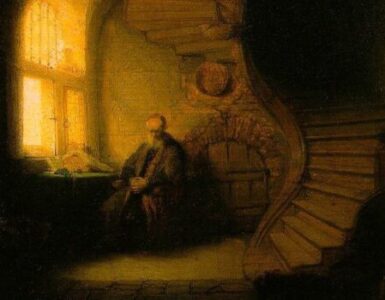Mark Twain is, without a doubt, one of the most recognizable names in the landscape of American literature. Best known for his novels recounting the adventures of Tom Sawyer and Huckleberry Finn up and down the Mississippi River Valley, the great American storyteller wrote much more besides, including several memorable short stories. One such story, under consideration here, is “The Five Boons of Life.”
From Twain’s writing and from the historical record, we glean that Twain was a Christian, at least nominally. He wove Christian sensibilities deeply into much of his literary work. This is especially true in “The Five Boons of Life,” his short story from 1902. There, in a scant 700 words, the author offers a very brief reflection on the greatest gifts of life, which carries a gravity far beyond its length. Any aficionado of storytelling, or any student of American history or the moral life will do well to reflect on the lessons offered therein.
The story begins with a “good fairy” approaching a young man with a basket of five gifts. The young man can take only one. “And be wary, choose wisely,” the fairy says, “oh, choose wisely! for only one of them is valuable.” Immediately, a reader recognizes that Twain is inviting him to consider the moral life, as morality deals specifically with human freedom and the ability to choose a destiny. Clearly, Twain wants to elicit within the reader a thought process about what he or she finds valuable. The reader is hooked, anxious to know if the young man’s choices might align with his or her own.
The gifts offered by the fairy are “Fame, Love, Riches, Pleasure, Death.” Here, Twain plunges the reader into the most serious moral question of all: the source of human happiness. This five-fold list calls to mind some of the well-known formulae of human temptations throughout the Christian tradition. For example, at the end of the first century, in his first New Testament letter, St. John the Evangelist lists “the desires of the flesh and the desires of the eyes and pride of life” as things of the world which people love above the Lord (1 Jn. 2:16). More than a millennium later, in the Summa Theologiae, St. Thomas Aquinas lists wealth, pleasure, power, and honor as four phenomena by which many human beings seek their greatest happiness (ST I-II, Q.2). We can appreciate Twain’s objective, and we can count him among the thinkers and writers who cause us to think about ultimate realities.
The young man in the story proceeds by making what he thinks is an obvious choice, and offers a reason why. Quickly, he realizes that this first gift “was short-lived and disappointing, vain and empty.” Finally, he admits, “If I could but choose again, I would choose wisely.” Here, Twain captures the reader’s attention by bringing up a question each of us has asked at least once: “Can I go back and choose again?” In an unexpected development, the fairy offers a proverbial do-over and directs the man, “Choose once more; and oh, remember—time is flying, and only one of them is precious.” So the story proceeds, up through the second, third, and fourth gifts.
Each time the fairy returns, the man is admonished to consider his choice carefully. Older and supposedly wiser at each juncture, reasons why his second, third, and fourth gifts should be better than each of the previous gifts. As each choice plays out, the man realizes that all the gifts have glaring negative effects. Finally, after the fourth choice, and the subsequent misery that visits him, the man screams out from the depths of his heart: “Curse all the world’s gifts, for mockeries and gilded lies! And miscalled, every one. They are not gifts, but merely lendings. Pleasure, Love, Fame, Riches: they are but temporary disguises for lasting realities — Pain, Grief, Shame, Poverty.”
At this juncture, the man admits that he knows that the four gifts he has chosen previously are “poor and cheap and mean.” He reckons that the final gift, Death, is the “inestimable one, that dear and sweet and kindly one, that steeps in dreamless and enduring sleep the pains that persecute the body, and the shames and griefs that eat the mind and heart.” In this moment, he calls out for death that he might rest. This causes a reader to consider whether he has taken the same attitude to life and gifts and difficulties. Would it be easier to check out and end the misery, so to speak? Yet, in a clever turn, even this gift is denied; and all that is left to the man is “the wanton insult of Old Age.”
This short story is a treasure for the study of moral philosophy and theology. Within just a couple short pages, it opens some important considerations for the reader about gifts and benefits in this life. Are there some gifts that only have positive effects? Why do gifts have both positive and negative effects? Have I experienced more positive or negative effects from the gifts in my life? Have I become cynical or despondent as gifts might not have developed in the ways I expected?
Ultimately, this story leads us into a consideration of hope. What is authentic hope? Does hope depend on the proliferation of positive trends only? Is hope possible even when negative effects abound? What is the source of hope that transcends negative effects? Thus, the enduring value of reading and considering Mark Twain’s “The Five Boons of Life” is that it causes each reader to sharpen his or her thoughts in answer to life’s most serious questions.
Photo by Kostiantyn Li on Unsplash










